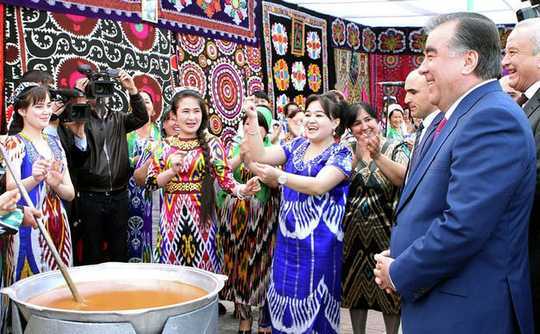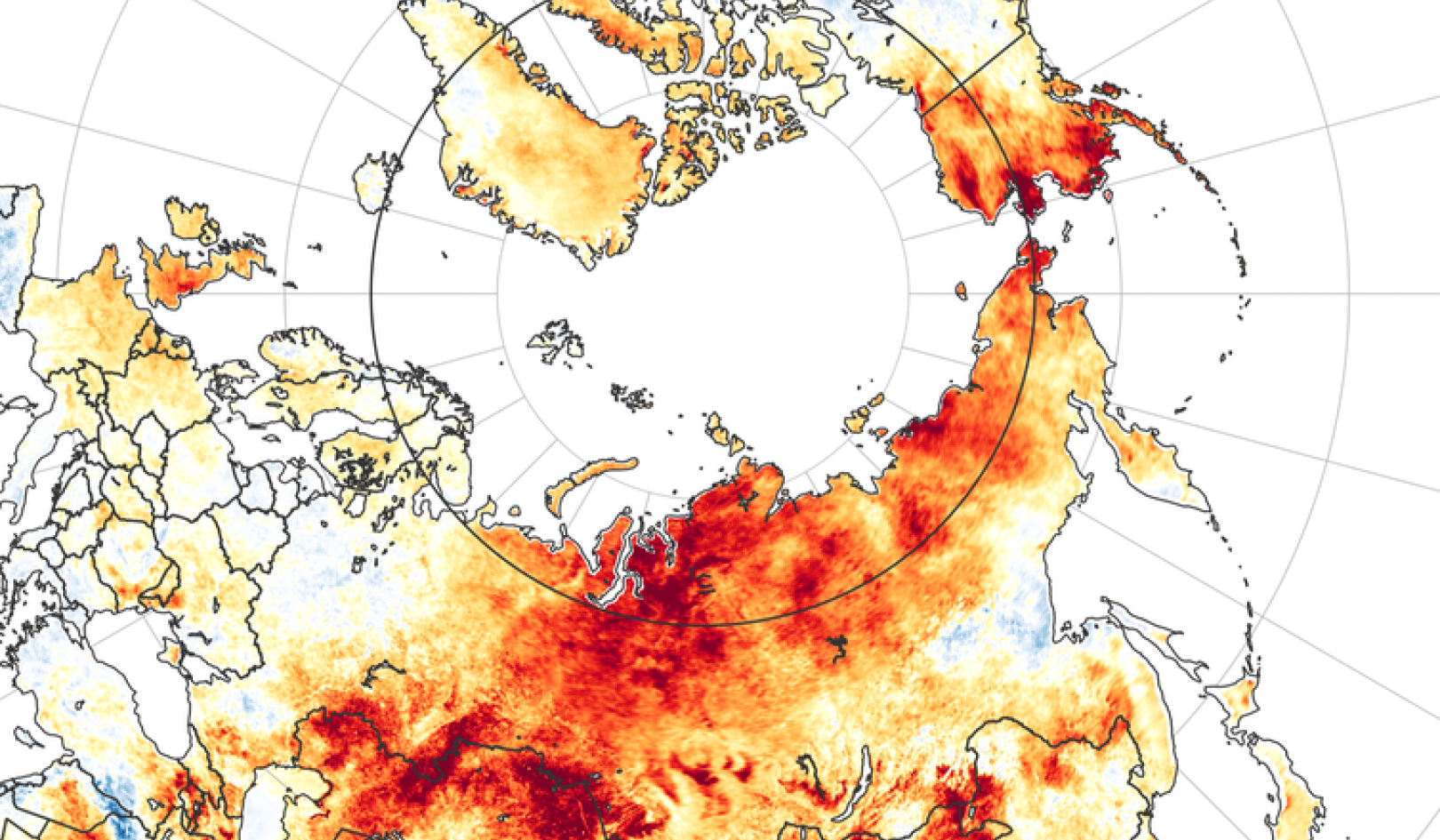 Business as usual for the Tajik president, Emamoli Rakhmon, at the new year ‘Nowruz’ celebration in March. Press service of the president of Tajikistan.
Business as usual for the Tajik president, Emamoli Rakhmon, at the new year ‘Nowruz’ celebration in March. Press service of the president of Tajikistan.
The authoritarian Central Asian state of Tajikistan admitted to its first cases of COVID-19 in late April. This followed a World Health Organization (WHO) decision to dispatch a team to investigate previous claims that the country was coronavirus-free.
To the west, Tajikistan’s near neighbour Turkmenistan, known as the North Korea of Central Asia, continues to report no COVID-19 cases and has avoided use of the word coronavirus as much as possible in order to deter the spread of information about the pandemic. Turkmen police have reportedly arrested citizens found to be discussing coronavirus in public, or wearing protective masks.
Meanwhile, in Belarus – which has earned the moniker of “Europe’s last dictatorship” – the president, Alexander Lukashenko, advocated vodka, hockey, and folk medicine against the virus and in April reassured Belorussians that “nobody will die from coronavirus in our country”. As of May 21, Belarus has already registered more than 32,000 coronavirus cases and 179 deaths.
Censorship, repression, and disinformation are hardly new strategies for post-Soviet regimes. Just like many of their counterparts elsewhere in the world, Central Asia’s authoritarian strongmen have weaponised the pandemic to further consolidate their hold on power – those, that is, who have acknowledged the virus threat in the first place.
Just as COVID-19 has offered opportunities to authoritarian – and would-be authoritarian – leaders, so it also presents significant challenges. Authoritarian rule is sustained by a range of tools and mechanisms, from coercion to co-option, but can rarely survive a major crisis without offering something more. Authoritarian regimes often define this “something more” as strength and stability, and this has also been the case during COVID-19. For example, Kazakhstan’s state and state-aligned media has been replete with references to “discipline” in recent weeks.
A global pandemic can play into the hands of authoritarian rulers in this regard, but it can also leave them dangerously exposed.
 Data from John Hopkins Coronavirus Resource Center, CC BY-SA
Data from John Hopkins Coronavirus Resource Center, CC BY-SA
When repression isn’t enough
In Kazakhstan, Kyrgyzstan and Uzbekistan, authorities have enforced lockdown and quarantine measures in a typical Soviet military style. Soldiers equipped with guns and armoured vehicles are patrolling public spaces and restricting the movement of citizens and traffic between, and within, cities.
In Uzbekistan, the General Prosecutor’s office recommended that citizens keep personal diaries of who they meet, when and where. Given the extensive power of the General Prosecutor’s Office, such a “recommendation” should be perceived by Uzbek citizens as an obligation.
Kazakhstan is actively using intellectual facial recognition technologies and a video camera system called Sergek, which means “sharp eye” in Kazakh, to catch and fine citizens who violate quarantine restrictions.
The Kazakhstani authorities are planning to introduce a new mobile application, developed by the Ministry of Health Care and local government of Nur-Sultan city, called Smart Astana to track physical movement of citizens who are in quarantine. In the context of these Central Asian regimes in particular, the use of such technologies presents a high risk of data abuse and manipulation by the authorities.
 Entry post to Nur-Sultan city, the capital of Kazakhstan. Saltanat Janenova
Entry post to Nur-Sultan city, the capital of Kazakhstan. Saltanat Janenova
Despite the risks, citizens from Central Asian countries have flooded social media with photos and videos complaining about the devastating conditions in hospitals and quarantine facilities within days of the outbreak. Some 170 people being held in quarantine at a former US military base in Kyrgyzstan complained of bad smells, a lack of heating, and “horribly cold and dirty” conditions.
Kazakhstan, Kyrgyzstan and Uzbekistan swiftly enforced state of emergency legislation prohibiting photo and video recordings in medical institutions and quarantine facilities. They threatened people who disobeyed with prosecution for “spreading false information”. Some civic activists, bloggers and journalists have already been imprisoned on the same charge.
Trust issues
In Tajikistan, Turkmenistan and Belarus, governments have continued to operate as if business were carrying on as usual. They have denied the pandemic and given a green light to large celebrations such as the New Year (“Nowruz”) celebrations at the end of March in Tajikistan, World Health Day in April in Turkmenistan, and a military parade in Belarus in May.
In the absence of a strong government public health response, many Turkmens and Belarussians are limiting their contacts and avoiding mass gatherings voluntarily.
More widely, there has been a gradual loss of public trust in Central Asian governments’ competence in recent years, resulting from weak policy implementation capacity, rampant corruption, and limited citizen engagement.
In this context, the authoritarian governments in the former Soviet bloc have responded to the pandemic by reinforcing their grip on power even further. Temporary measures introduced during the emergency, such as harsh legislative measures and new surveillance tools, are likely to remain a permanent feature of the new normal. But at the same time, the pandemic has left these regimes dangerously exposed to the risks of rising public discontent unless they take measures to regain the trust of their citizens.![]()
About The Author
Saltanat Janenova, Teaching Fellow in Public Policy and Management, University of Birmingham and Jonathan Fisher, Director, International Development Department, University of Birmingham
This article is republished from The Conversation under a Creative Commons license. Read the original article.

Related Books:
On Tyranny: Twenty Lessons from the Twentieth Century
by Timothy Snyder
This book offers lessons from history for preserving and defending democracy, including the importance of institutions, the role of individual citizens, and the dangers of authoritarianism.
Click for more info or to order
Our Time Is Now: Power, Purpose, and the Fight for a Fair America
by Stacey Abrams
The author, a politician and activist, shares her vision for a more inclusive and just democracy and offers practical strategies for political engagement and voter mobilization.
Click for more info or to order
How Democracies Die
by Steven Levitsky and Daniel Ziblatt
This book examines the warning signs and causes of democratic breakdown, drawing on case studies from around the world to offer insights into how to safeguard democracy.
Click for more info or to order
The People, No: A Brief History of Anti-Populism
by Thomas Frank
The author offers a history of populist movements in the United States and critiques the "anti-populist" ideology that he argues has stifled democratic reform and progress.
Click for more info or to order
Democracy in One Book or Less: How It Works, Why It Doesn't, and Why Fixing It Is Easier Than You Think
by David Litt
This book offers an overview of democracy, including its strengths and weaknesses, and proposes reforms to make the system more responsive and accountable.























